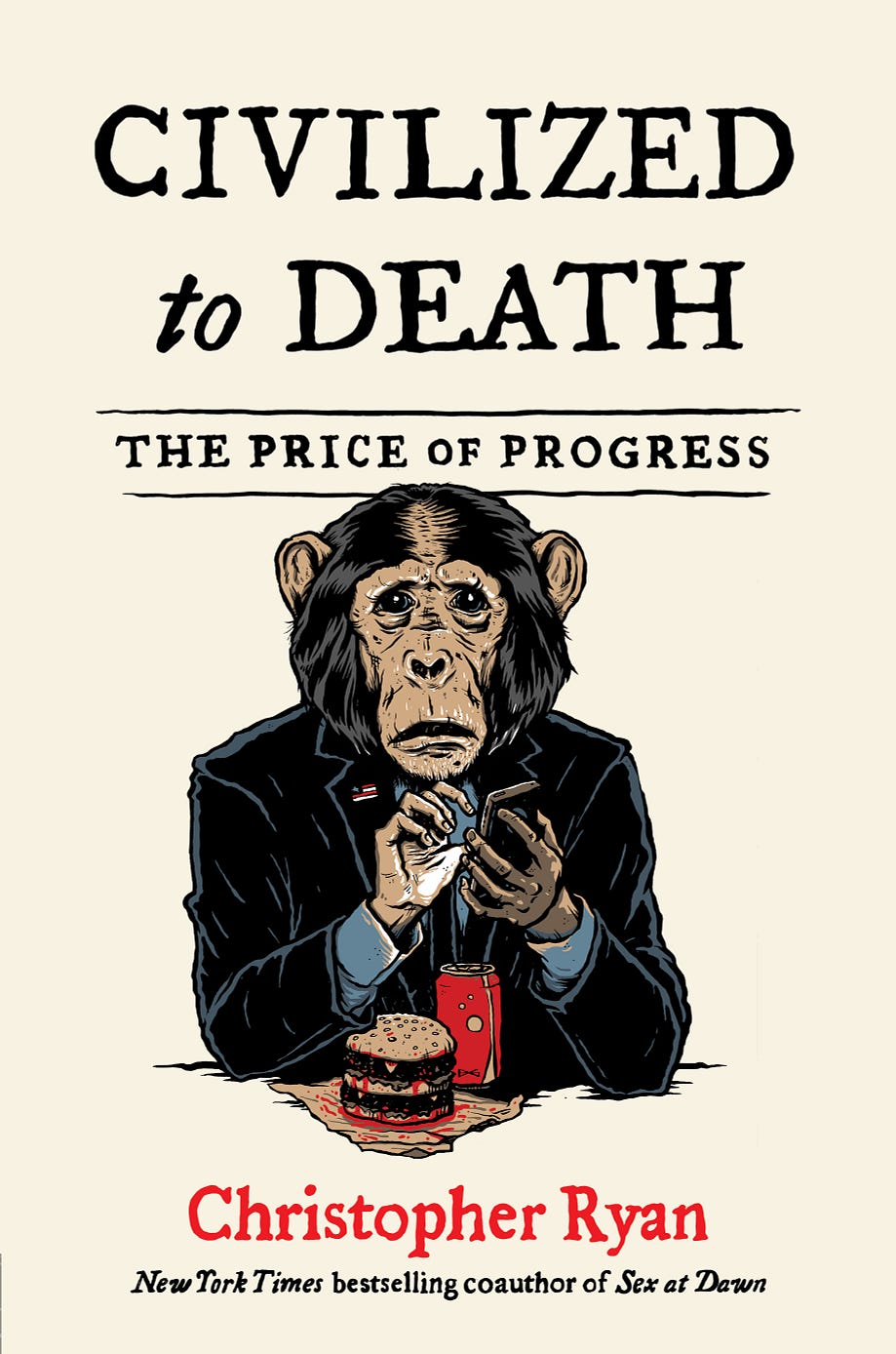Another point made sounds a bit cynical:
"[T]oday’s longevity is a net loss from that period in terms of functional longevity; we are simply expanding the period of suffering from dying."It's not like our early ancestors didn't also suffer, albeit under a dramatically different array of circumstances. And it smacks as contradictory to the extend that we need our grandparents and great grandparents. My beloved 93-year-old mother-in-law, herself a great grandparent to dozens of grandchildren and great-grandchildren is a total total rock star in our family and community. So it's not solely an issue how we fare as elders, but how we value them, alongside the very idea of becoming elderly, as well.
Moreover, there's no analysis that I can tell of the havoc wrought by Western European colonialism. In any case, his point is well taken that we indeed pay a terribly high cost for so-called "civilization."
Here's a review.
-Angela Valenzuela
Civilization Has Led Us To Misery, Adopt The Practices Of The Past And Be Happier.

In Civilized to Death — The Price of Progress, author Christopher Ryan proposes the most controversial explanation offered today for what is wrong with our world. The problem began with advent of agriculture which gave rise to civilization: the movement of human activity from a life of cooperative community foraging together to one of individual competition for personal gain. Ryan notes that scholars wonder why for thousands of years, when humans lived in hunter-gatherer (forager) societies, “nothing was happening” to signify progress. His explanation is that humans were essentially happy and satisfied with their lives. Then they became civilized promoting the concept of progress that has led humanity into misery.
Digging into a treasure trove of research on pre-historic societies and those of the few existing forager societies, Ryan demonstrates that measures of health, longevity, security, and leisure have all declined because of civilization. He notes that “skeletal remains confirm that neither famine nor obesity were common until the advent of civilization.” Researcher Eileen Crimmins found that while pre-historic life was short lived, data shows that today’s longevity is a net loss from that period in terms of functional longevity; we are simply expanding the period of suffering from dying.
Ryan posits that civilization has given rise to competitive institutions that thrive on ever expanding commerce, displacing the sense of meaning and happiness that humans had during the 99% of our existence on this planet. This decline is due to the stratification of communities into hierarchical status groups that accompanied agriculture, such as owner and worker, man and women, and wealthy and poor.
Using data from modern day American life as a prime example of how this stratification has taken us from a past paradise to our current dystopia, Ryan cites a 2013 Gallup poll showing “that 70 percent of Americans hate their jobs…” The impact is that “the use of antidepressants in the U.S. is up nearly 400 percent since 1990.” A section of his book shows how our culture even denies us one of the few nonaddictive drugs that the ancients used to achieve happiness, psychedelics.
Another section focuses on how the free expression of sexuality is thwarted in our society, unlike the sexually liberal forager societies. This repression results in enraged perversions of desire, particularly among males. Ryan references an essay by philosopher Stephen Asma linking this condition to the rise of male terrorist acts. In 2016, Asma wrote “Of the past 129 mass shootings in the United States, all but three have been men. The shooter is socially alienated, and he can’t get laid.”
While these examples illustrate how civilization has corrupted our initial non-aggressive human nature, the author could have tackled some possible exceptions. For instance, there is not a word about the fate of the foraging Neanderthals, our closest relation in the Homo genus. They disappeared when foraging Homo Sapiens came into contact with them. Could possible aggressive behavior from us account for their demise?
Ryan draws a hard line between forager and farmer societies, but fails to analyze the role of herders, which are as nomadic at the foragers, but they tend animals. Would they be inclined toward peaceful or aggressive behavior? The nomadic Mongols were not considered civilized by the great states that existed in the thirteenth century; however, they all fell violently to Genghis Kahn and his herder-hunter tribes.
Civilized to Death is a fascinating read, with plenty of references to studies. However, Ryan provides only a few examples of how to foster and preserve elements of our lost forager culture. He does cite the practices of the progressive European societies that replicate the forager parenting values by assuring community support for parents via generous maternity and paternity leave.
Ryan barely mentions that foraging societies usually consisted of fewer than a 150 people. Yet he says that close personal contact was critical to fostering community cooperation. Because he recognizes that the advent of agriculture accelerated population growth, and stratified communities into competing groups, he supports reducing birth rates.
Ryan also encourages capturing the egalitarianism and empathy of the forager societies by promoting “peer networking”. The successful non-centralized Kickstarter app, which uses cooperation to fund projects, is his prime example.
After blaming civilization’s problems on the idea of progress, Ryan returns to it as something positive, describing another period of Enlightenment, when progressive thought celebrated ancient Rome and Greece. This time, progress would mean introducing forager practices into our modern world, replacing top-down corporate structures with communal alternatives.
Progress may just be what saves our civilization
WRITTEN BY


No comments:
Post a Comment